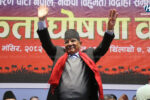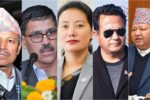KATHMANDU: The Health AI for All Conference (HAI Con) 2025 has commenced in Kathmandu, aiming to foster knowledge sharing, collaboration, and innovation in the field of health artificial intelligence (AI) for developing countries like Nepal.
The conference is organized by the Health AI for All Network (HAINet), established to address healthcare challenges in resource-constrained settings through AI-driven solutions.
HAINet’s governing committee comprises three-quarters of members from developing and emerging nations, aligning with its mission to empower these countries to identify and address healthcare issues using AI.
According to Dr Kiran Raj Pandey, a founding member of HAINet, the network was initiated in late 2024 with Nepal’s leadership to extend the benefits of health AI to populations with limited resources.
Dr Pandey highlighted that the conference would explore how AI can revolutionize healthcare delivery, enhance human health, and improve accessibility.
The event is particularly centered on fostering collaboration among developing nations to identify their health priorities and take ownership of AI-driven solutions.
He stated that HAINet aims to support developing countries in establishing their scientific agendas, determining their needs, and sharing expertise to address them through policy initiatives and technological exchanges.
Dr Bishesh Khanal, another founding member, highlighted the importance of promoting developing nations as not just consumers but also producers of AI technology.
He said the conference will also showcase world-class research conducted in Nepal in the field of health AI, demonstrating the country’s potential to lead innovation in this domain.
Binod Bhattarai, an associate professor at the University of Aberdeen and a HAINet member, noted that while AI is widely used in healthcare across developed nations, patients in resource-limited countries like Nepal risk being left behind.
He stressed that the conference would play a pivotal role in helping developing nations prioritize their healthcare challenges and take ownership of AI development to address them.
Bhattarai remarked that through health AI, patients and users in developing nations like Nepal can significantly benefit, and the conference is designed to host policy discussions on how to achieve this goal.
The two-day conference, co-hosted by Nepal’s Ministry of Health and Population and the Nepal Applied Mathematics and Informatics (NAMI), features a series of sessions aimed at discussing the integration of AI into healthcare systems in countries like Nepal.
The sessions include exploring how AI can be developed as a universally accessible tool, analyzing its current state, and deliberating on strategies to ensure that no one is excluded from its benefits.
Experts from Asia, Africa, North and South America are presenting papers on the potential and challenges of integrating AI into healthcare systems, as well as on the policy frameworks required to support its implementation.
The conference serves as a platform for researchers, healthcare professionals, policymakers, and patients to engage in meaningful discussions about the practical applications and implications of health AI.
With virtual participation from hundreds of viewers worldwide, the event underscores its global significance.
By making AI a transformative force in global healthcare, HAICon 2025 aims to lay the groundwork for innovative solutions that cater to the unique needs of developing nations while ensuring inclusivity and accessibility for all.








Comment